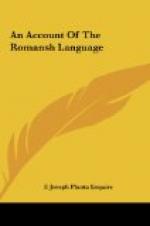The grammatical variations, the syntax, and the genius of the language, must in this, as well as in several other modern European tongues, have been derived from the Celtic; it being well known, that the frequent use of articles, the distinction of cases by prepositions, the application of two auxiliaries in the conjugations, do by no means agree with the Latin turn of expression; although a late French academician[AH] who has taken great pains to prove that the Gallic Romance was solely derived from the Roman, quotes several instances in which even the most classical writers have in this respect offended the purity of that refined language. It cannot here be denied, that as new ideas always require new signs to express them, some foreign words, and perhaps phrases, must necessarily, from time to time, have insinuated themselves into the Romansh, by the military and some commercial intercourse of the Grisons with other nations; and this accounts for several modern German words which are now incorporated into the language of the Engadine.[AI]
The little connexion there is in mountainous countries between the inhabitants of the different valleys, and the absolute independence of each jurisdiction in this district, which still lessens the frequency of their intercourse, also accounts, in a great measure, for the variety of secondary dialects subsisting in almost every different community or even village.
The oldest specimens of writing in this language are some dramatical performances in verse upon scriptural subjects, which are extant only in manuscript. The Histories of Susanna, of the Prodigal Son, of Judith and Holofernes, and of Esther, are among the first; and are said to have been composed about the year 1560. The books that have since been printed are chiefly upon religious subjects; and among those that are not so, the only I have ever heard of are a small code of the laws of the country in the Cialover dialect, and an epitome of Sprecher’s Chronicle, by Da Porta, in the Ladin.
* * * * *
The language spoken in Gaul from the fifth to the twelfth centuries being evidently a mixture of the same Roman and Celtic ingredients, and partaking of the same name with those of the Grisons; it will, I hope, not be thought foreign to the subject of this letter, if I enter into a few particulars concerning it, as it seems to have been an essential part, or rather the trunk, of the language, the history of which I am endeavouring to elucidate.
One of the many instances how little the laboured researches of philologists into the origin of languages are to be depended upon, is the variety of opinions entertained by French authors concerning the formation of the Gallic Romance. A learned Benedictine[AJ] first starts the conjecture, and then maintains it against the attacks of an anonymous writer, that the vulgar Latin became the universal language of Gaul immediately after Caesar’s conquest, and that




